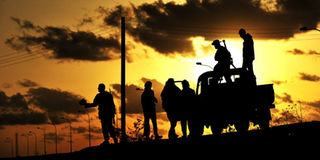Libyan rebels flee as state TV says town free

Libyan rebel fighters are silhouetted at sunset on March 7, 2011 in the oil centre of Brega. An AFP reporter saw dozens of rebels pulling out of the coastal town of Brega and heading for Ajdabiya. AFP PHOTO/ROBERTO SCHMIDT
BREGA, Sunday
Libyan rebels abandoned another key town on Sunday after heavy shelling by government forces pressing their advance as international backing slowly grew for a no-fly zone over the country.
An AFP reporter saw dozens of rebels pulling out of the coastal town of Brega and heading for Ajdabiya, 80 kilometres away on the road to the main rebel cities of Benghazi and Tobruk.
Rebel sources said forces loyal to strongman Muammar Gadaffi were advancing from the west after seizing the town of Uqayla and the village of Bisher 20 kilometres from Brega.
In Benghazi all mobile telephone communications were suddenly cut today for an unknown reason. It was not immediately clear if other rebel-held areas were also affected.
Rebel morale had been boosted on Saturday by an Arab League decision to support plans to impose a no-fly zone over Libya and make contact with the insurgents’ provisional national council in Benghazi.
Arab foreign ministers urged the UN Security Council “to assume its responsibilities in the face of the deteriorating situation in Libya and take the necessary measures to impose an air exclusion zone for Libyan warplanes.”
The United States welcomed the Arab League decision, which “strengthens the international pressure on Gadaffi and support for the Libyan people,” White House spokesman Jay Carney said in a statement.
“The international community is unified in sending a clear message that the violence in Libya must stop, and that the Gadaffi regime must be held accountable,” he said.
“The United States will continue to advance our efforts to pressure Gadaffi, to support the Libyan opposition, and to prepare for all contingencies, in close coordination with our international partners,” he added.
But he stopped short of giving full support for the no-fly zone which is being pushed for by Britain and France especially, reflecting divisions in the administration of President Barack Obama.
Mr Obama’s Defence Secretary Robert Gates said on Saturday that the United States and its allies could impose such a zone militarily but it remained unclear if it would be a “wise” move.
US Secretary of State Hillary Clinton was leaving Washington today for an overseas tour to find ways to help Libya’s opposition and maintain the momentum of pro-democracy revolutions in the region.
She is due first in Paris for talks with Mahmud Jibril, a member of the opposition national council, before going on to Tunisia and Egypt, where she will become the highest-level US official to visit since their presidents were toppled in January and February respectively.
In Paris on Monday, Clinton will also meet her counterparts from host France as well as Russia, Britain, Canada, Germany, Italy and Japan to discuss combat-torn Libya amid divisions over calls for foreign military intervention.
The United States has agreed to name a special envoy to deal with the opposition, but has refrained from recognising any particular leader or group as it struggles to understand the nebulous movement.
Clinton has said a plan for a no-fly zone over would be presented to Nato on Tuesday. Washington has said it would soon send humanitarian aid teams to rebel-held areas of eastern Libya, but cautioned the move should not be seen as military intervention.
Britain’s Foreign Office said the Arab League’s support for a no-fly zone was “very significant” for its efforts to introduce the measure.
Britain and France have drawn up a UN Security Council resolution on a no-fly zone but the resolution faces opposition from veto-wielders China and Russia as well as splits within the European Union.




